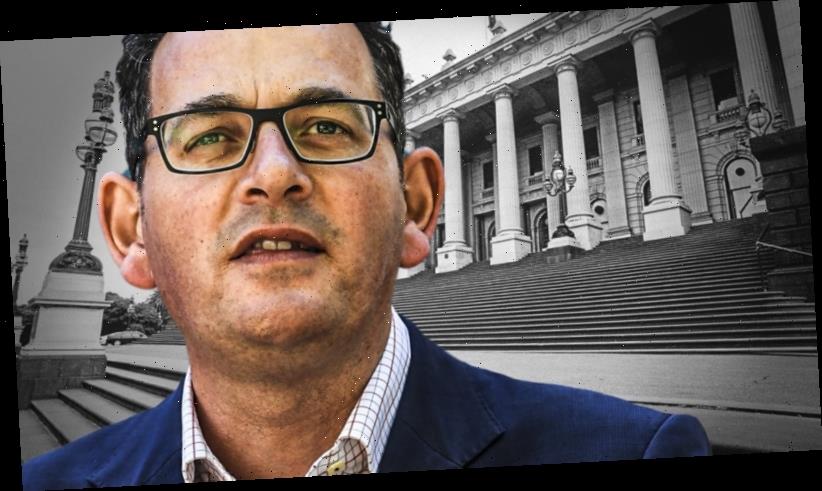On Easter Sunday, Daniel Andrews made a revelation which shocked his colleagues.
The Victorian Premier, who is on leave after a serious fall, tweeted that he is walking for 18 minutes each day. No doubt a huge achievement given the seriousness of his injuries last months.
A photo shared by Daniel Andrews last month when he was moved from ICU.Credit: Supplied
But inside Labor’s caucus, the response was mostly shock coupled with a bit of frantic counting.
For the most part, Labor MPs have been kept in the dark about Andrews’ condition. Most of his colleagues assumed he was on track to return to Spring Street six weeks after he took leave as he had planned. That would seem him back at Treasury Place just after Anzac Day.
To doctors and physios, the 18 minutes of walking Andrews is doing each day may be considered a monumental victory given he fractured his T7 vertebrae. But politics is a little more brutal than that, and the revelation instead reignited debate about his eventual successor.
It’s difficult to believe, but a little over a decade ago when Andrews was elected leader of the Victorian Labor Party following the resignation of John Brumby, he was considered a stop-gap leader.
John Brumby with his wife Rosemary after announcing his resignation from politics. Daniel Andrews was always considered a stop-gap premier.Credit:John Woudstra
That meant he was effectively keeping the chair warm until someone better came along. He was viewed as too young, unknown and from the wrong faction. In those early years, during one infamous focus group, he was described as the “the guy who looks like an accountant and hunches”.
More than 10 years on and Andrews is one of the most recognised faces in Australian politics and is on track to be one of the longest-serving Labor premiers in Victoria. Against the odds, he also remains relatively popular despite failures in the state’s hotel quarantine program which triggered months of restrictions.
It’s not the first time succession planning has taken over at Spring Street. After his last election win, colleagues believed the Premier would throw in the towel ahead of the 2022 election and might even consider a stint working overseas. But a pandemic and a slip on some wet steps changed all that.
As British prime minister Harold Macmillan put it when asked what troubled him about politics, “events, dear boy, events”. Labor MPs remain split about whether these “events” will fast track or derail his plans to leave politics ahead of the 2022 poll.
Even Daniel Andrews biggest critics agree he is central to Labor’s success story.Credit:Chris Hopkins
Some MPs argue that border closures, a smaller jobs market and healthy dash of ego will be enough to ensure he stays at Spring Street past 2022. But others believe, or unfairly hope, his injuries and associated complications might be too much, especially during a gruelling election campaign due next year.
In that scenario, a successor would need to be found.
Even Andrews’ biggest internal critics agree that Andrews the man is central to Labor’s success story and that replacing him 18-months from the election would be a difficult task.
Most Labor MPs agree that Andrews would see Transport Infrastructure Minister Jacinta Allan as his natural successor. Like Andrews, Allan’s support comes from the party’s Left. She was elected in 1999 and is the state’s longest-serving female minister. But her title as Andrew’s notional heir apparent has put some noses out of joint, especially amongst the party’s Right and Socialist Left. As has her manner when dealing with colleagues, oddly a criticism rarely levelled at men.
Transport Infrastructure Minister Jacinta Allan is considered the most likely successor.Credit:Joe Armao
But Allan’s experience and regional credentials will work in her favour. One Labor frontbencher said: “There is no question around her capability. The fundamental issue is internal authority which she lacks.“
Allan’s stocks looked to be rising when former attorney-general Jill Hennessy stepped out of the cabinet last year. But Hennessy remains a popular MP and could potentially marshall cross factional support for the top job.
In Victoria, the party room is notionally controlled by Right-aligned MPs. In the past, the politically savvy Andrews has been effective at securing cross-factional support. But in his absence, the Victorian Right faction is expected to seek to promote a candidate from within its own ranks.
Andrews’ deputy, James Merlino, is considered loyal to the boss and insists he’ll be pleased to hand back the keys when Daniel Andrews returns. But colleagues have been surprised by his “rapid transformation” and ease in which he has taken on the new role.
There is a broad acknowledgement that while the centrality of Andrews’ governance has been critical to the party’s success, it has also been the subject of internal criticism. By contrast, Labor MPs report Merlino, who is from the Right, as being more inclusive which they seem to enjoy.
But Merlino remains relatively unknown in the wider public and may struggle to beat internal rival Martin Pakula who has more influence over factional forces on the Right.
Then there are the up-and-comers. When Daniel Andrews was elected leader of the Victorian Labor Party he hadn’t celebrated his 40th birthday. His unexpected departure could create a power vacuum which could see a similar outside succeed.
Annika Smethurst is state politics editor.
Most Viewed in Politics
From our partners
Source: Read Full Article




